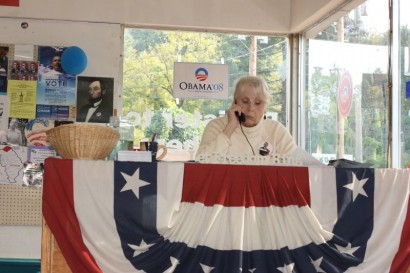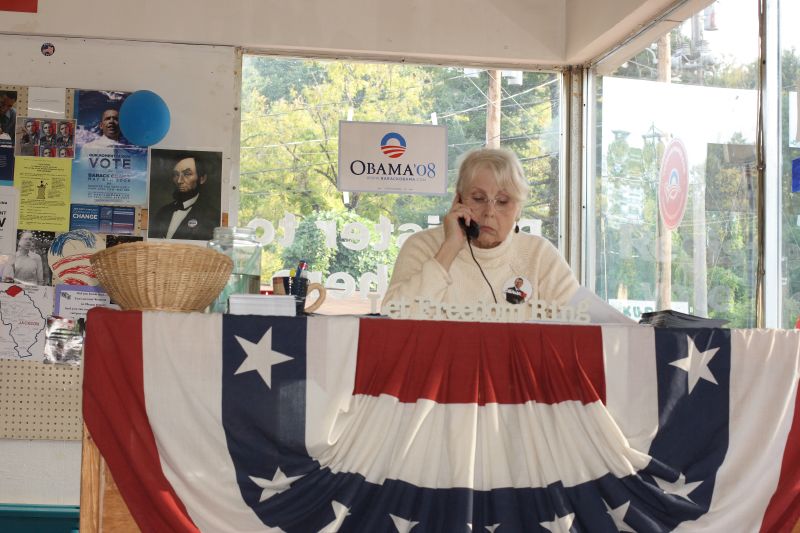
A volunteer for the 2008 Obama campaign. (Photo: Amburn Everett/flickr)
Michael Dompas, an Indonesian native who has just been sent overseas by his employer, plans to return this fall to help with President Obama’s reelection campaign.
“I’m allowed to do this,” he explained. “I was so frustrated by the Supreme Court’s decision over the results of the 2000 presidential elections that I just had to do something. I wanted to give money and volunteer. So I consulted a friend who at that time worked for the Federal Elections Committee.”
His friend told him that as a legal permanent resident (a Green Card holder) Dompas can give money and volunteer for political campaigns.
Since then, the Indonesian banker canvassed for Tim Kaine during his 2001 run for lieutenant governor of Virginia and manned the phones for presidential candidate John Kerry in 2004. In 2008, Dompas took two weeks off from work to campaign for then Senator Obama.
The outcome of November’s elections will not only affect the lives of native-born Americans but immigrants as well. For that reason some foreign-born individuals are doing what they can to get the candidate they believe has their best interest in mind elected.
Yet the Federal Elections Commission bans foreign nationals from “contributing, donating or spending funds in connection with any federal, state, or local election in the United States, either directly or indirectly.”
Foreign nationals include those who are not legal permanent residents or do not have Green Cards such as students, business travelers, temporary workers, and tourists. The commission also prohibits foreign governments, political parties, corporations, associations and partnerships from intervening in U.S. elections.
In October 2010, two foreign nationals who live and work lawfully in the United States filed suit in the U.S. District Court for the District of Columbia challenging the constitutionality of this prohibition.
Benjamin Bluman and Asenath Steiman argued that the ban violated the First Amendment and since they are here legally, their freedom of speech was also protected.
Bluman, a Canadian and self-described “passionate” Democratic supporter, wanted to donate to the 2008 Obama campaign. Steiman, who holds dual Canadian and Israeli citizenship, wanted to contribute to Republican Sen. Tom Coburn, the party’s National Senatorial Committee, and the Club for Growth.
The District Court dismissed Bluman and Steiman’s challenge last August and the Supreme Court issued an order Monday upholding the statute against foreigners making financial contributions.
Adolfo Franco, a Republican strategist who was an advisor to John McCain’s 2008 presidential campaign, clarifies that anyone who is in the United States, with or without a green card, can volunteer for political campaigns so long as they do not make financial contributions, make in-kind donations, or are compensated for services they render.
“Freedom of expression applies to everyone,” he said.
Franco adds that the Republican National Committee doesn’t encourage or discourage legal immigrants from volunteering.
“We do not draw a distinction between U.S. citizens or legal permanent residents,” he said. There is “no vetting process for people who walk in the door to volunteer.”
Indeed, the RNC’s website does not mention anything about who can volunteer but does check the eligibility of anyone who donates.
Dompas shared that though he is not a naturalized citizen he gets involved “because I live here and the policies and decisions made by elected officials affect my life.”
He supports the Democratic Party because he says its core values are aligned with his own. “They care about the individual, about social welfare, which in the long run can only improve society,” he said. “They fight for social justice which is important to me as a Catholic.”
Franco believes, however, that immigrants will likely fare better under a Republican administration. In particular, he argues that immigration reform stands a better chance with the GOP.
“Comprehensive immigration reform will become law but only with a Republican president,” he asserted, “because most Americans would trust Republicans with immigration just as they would feel more comfortable with Democratic leadership on issues such as Social Security and Medicare. A lot of Americans think the Democratic Party is soft on the border security and illegal immigration issue and that Democrats are not really serious about tackling the illegal issue or adequate border security.”
Dompas, on the other hand, believes that immigrants will be better off with a Democrat in the White House and said he will do everything he can to help Mr. Obama keep his job.
Dompas is justified in wanting to get involved in a campaign, as are Bluman and Steiman, as are all people living in the U.S.—citizens and non-ctizens alike—because we are all affected by the policy decisions and rhetoric of our elected officials.
But the prohibition on foreign nationals influencing, and in particular, financially contributing, to U.S. elections is sound. We want people who are truly invested in the welfare of the United States, and who identify as Americans, determining its future through the electoral process.
Arguably, there are foreign nationals who want nothing more than to be U.S. citizens or at least have a green card but currently have no visible path to citizenship. These are the unauthorized immigrants who have planted their roots with American children, jobs and homes in communities across the country. People who have lived here for decades and know no other home, and who want to contribute fully to this country.
The question then for immigrants and their advocates is which party will give them the best chance to legalize their status and earn a voice, and a vote, in our democracy.
You can follow Erwin de Leon on Twitter or read his blog.
Feet in Two Worlds is supported by the New York Community Trust and the John S. and James L. Knight Foundation with additional support from the Mertz Gilmore Foundation and the Sirus Fund.


A volunteer for the 2008 Obama campaign. (Photo: Amburn Everett/flickr)
Michael Dompas, an Indonesian native who has just been sent overseas by his employer, plans to return this fall to help with President Obama’s reelection campaign.
“I’m allowed to do this,” he explained. “I was so frustrated by the Supreme Court’s decision over the results of the 2000 presidential elections that I just had to do something. I wanted to give money and volunteer. So I consulted a friend who at that time worked for the Federal Elections Committee.”
His friend told him that as a legal permanent resident (a Green Card holder) Dompas can give money and volunteer for political campaigns.
Since then, the Indonesian banker canvassed for Tim Kaine during his 2001 run for lieutenant governor of Virginia and manned the phones for presidential candidate John Kerry in 2004. In 2008, Dompas took two weeks off from work to campaign for then Senator Obama.
The outcome of November’s elections will not only affect the lives of native-born Americans but immigrants as well. For that reason some foreign-born individuals are doing what they can to get the candidate they believe has their best interest in mind elected.
Yet the Federal Elections Commission bans foreign nationals from “contributing, donating or spending funds in connection with any federal, state, or local election in the United States, either directly or indirectly.”
Foreign nationals include those who are not legal permanent residents or do not have Green Cards such as students, business travelers, temporary workers, and tourists. The commission also prohibits foreign governments, political parties, corporations, associations and partnerships from intervening in U.S. elections.
In October 2010, two foreign nationals who live and work lawfully in the United States filed suit in the U.S. District Court for the District of Columbia challenging the constitutionality of this prohibition.
Benjamin Bluman and Asenath Steiman argued that the ban violated the First Amendment and since they are here legally, their freedom of speech was also protected.
Bluman, a Canadian and self-described “passionate” Democratic supporter, wanted to donate to the 2008 Obama campaign. Steiman, who holds dual Canadian and Israeli citizenship, wanted to contribute to Republican Sen. Tom Coburn, the party’s National Senatorial Committee, and the Club for Growth.
The District Court dismissed Bluman and Steiman’s challenge last August and the Supreme Court issued an order Monday upholding the statute against foreigners making financial contributions.
Adolfo Franco, a Republican strategist who was an advisor to John McCain’s 2008 presidential campaign, clarifies that anyone who is in the United States, with or without a green card, can volunteer for political campaigns so long as they do not make financial contributions, make in-kind donations, or are compensated for services they render.
“Freedom of expression applies to everyone,” he said.
Franco adds that the Republican National Committee doesn’t encourage or discourage legal immigrants from volunteering.
“We do not draw a distinction between U.S. citizens or legal permanent residents,” he said. There is “no vetting process for people who walk in the door to volunteer.”
Indeed, the RNC’s website does not mention anything about who can volunteer but does check the eligibility of anyone who donates.
Dompas shared that though he is not a naturalized citizen he gets involved “because I live here and the policies and decisions made by elected officials affect my life.”
He supports the Democratic Party because he says its core values are aligned with his own. “They care about the individual, about social welfare, which in the long run can only improve society,” he said. “They fight for social justice which is important to me as a Catholic.”
Franco believes, however, that immigrants will likely fare better under a Republican administration. In particular, he argues that immigration reform stands a better chance with the GOP.
“Comprehensive immigration reform will become law but only with a Republican president,” he asserted, “because most Americans would trust Republicans with immigration just as they would feel more comfortable with Democratic leadership on issues such as Social Security and Medicare. A lot of Americans think the Democratic Party is soft on the border security and illegal immigration issue and that Democrats are not really serious about tackling the illegal issue or adequate border security.”
Dompas, on the other hand, believes that immigrants will be better off with a Democrat in the White House and said he will do everything he can to help Mr. Obama keep his job.
Dompas is justified in wanting to get involved in a campaign, as are Bluman and Steiman, as are all people living in the U.S.—citizens and non-ctizens alike—because we are all affected by the policy decisions and rhetoric of our elected officials.
But the prohibition on foreign nationals influencing, and in particular, financially contributing, to U.S. elections is sound. We want people who are truly invested in the welfare of the United States, and who identify as Americans, determining its future through the electoral process.
Arguably, there are foreign nationals who want nothing more than to be U.S. citizens or at least have a green card but currently have no visible path to citizenship. These are the unauthorized immigrants who have planted their roots with American children, jobs and homes in communities across the country. People who have lived here for decades and know no other home, and who want to contribute fully to this country.
The question then for immigrants and their advocates is which party will give them the best chance to legalize their status and earn a voice, and a vote, in our democracy.
You can follow Erwin de Leon on Twitter or read his blog.
Feet in Two Worlds is supported by the New York Community Trust and the John S. and James L. Knight Foundation with additional support from the Mertz Gilmore Foundation and the Sirus Fund.
AboutErwin de Leon